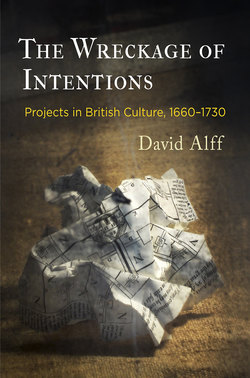The Wreckage of Intentions

Реклама. ООО «ЛитРес», ИНН: 7719571260.
Оглавление
David Alff. The Wreckage of Intentions
Отрывок из книги
The Wreckage of Intentions
Mary Thomas Crane and Henry S. Turner, Series Editors
.....
In this spirit, my chapters confront the project’s conceptual slipperiness by dividing the idea into concrete stages: the articulation, circulation, undertaking, and reception of ideas for new enterprise. Project authors composed persuasive arguments to render their schemes plausible and attractive. They worked alongside stationers to disseminate new proposals through print. They enacted written designs through performances known as undertakings. Finally, these attempts at reforming society stimulated public response. The idea of projects in seventeenth- and eighteenth-century Britain encompassed acts of writing, print, and performance. Therefore, my approach combines techniques of rhetorical analysis, book history, performance theory, and genre criticism to illuminate the multifaceted phenomenon of projection, from some of the era’s most ephemeral schemes to a few of its most enduring.
Chapter 1 shows how projects began as words. It identifies the rhetorical strategies that enabled Andrew Yarranton’s 1677 pamphlet England’s Improvement by Sea and Land to foresee the nation’s perfection through the establishment of a land registry, the dredging of canals, and the building of textile mills. This work employs several signature conventions of projection, including the comparison of a troubled present with better futures, the reconciliation of profit motives with the public good, and the representation of the Dutch Republic as a menacing threat and economic model. It is Yarranton’s occupation and evacuation of different conceits that makes his tract a striking example of how authors justified the work of reforming society. As a former captain in the New Model Army and suspected Presbyterian conspirator, Yarranton used projects to legitimate himself as a moderate reformer fit to voice an Anglican kingdom’s future interest. Close reading of England’s Improvement reveals how an especially resourceful projector manipulated language to solicit readerly belief in his ideas and talents.
.....